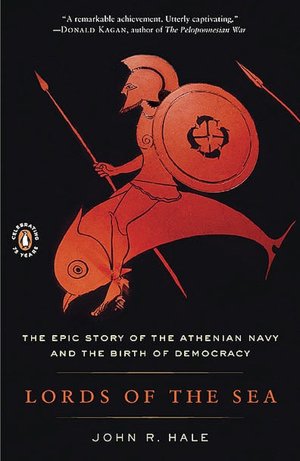I just read Lords of the Sea: The Epic Story of the Athenian Navy and the Birth of Democracy by John R. Hale.
This book traces the history of Athens from roughly 500 BC to 322 BC. It tells the story of the birth of the Athenian fleet, of a century and a half of constant naval warfare, of the rise and fall of two great leagues of Greek city states,. The book concludes with the final surrender of the Athenian fleet to Macedonia, the military occupation of Athens, and the exile of 3/5th of Athens citizens -- the effective end of Athens as a major power. This was the period of constant war.
Athens rose to prominence among the Greeks when its citizens led the resistance to the Persian invasion of Greece at sea while the Spartan army fought the Persians on land. Athens and Sparta contested for hegemony in the Peloponnesian Wars, 431 to 404 BC, finally ending with the victory of Athens. After Alexander the Great had conquered Persia (himself becoming the Great King), Athens accepted defeat at the hands of his successors. Even when not at war with Persia, Sparta or Macedonia, Athens seemed always to be fighting somewhere for more than a century and a half.
This period also saw the golden age of Athenian culture. The names come down to us -- Pericles, Demosthenes, Plato, Aristotle, Aristophanese, Themistocles, Thucydides, and more. We still admire the buildings and sculptures, the plays, the histories, the science and the philosophy of this Athenian golden age. It was also a period that saw the forests of Attica destroyed and the people of Athens become dependent on grain imported by sea.
John Hale makes the case that the political power of Athens during the period was based on the sea power created by its fleets of triremes. Its naval and political power allowed it to prosper economically, and thus to pay for the cultural explosion of the golden age.
The Greek word metis meant a quality that combined wisdom and cunning. This quality was considered to be highly admirable and was regarded by Athenians as one of the notable characteristics of the Athenian character. WikipediaHale describes tactics used by the Athenian flotillas during naval battles, stressing the metis of the admirals who tricked their enemies into false moves, and arrayed the Athenian forces to take full advantage of those enemy mistakes. The trait of mind was valued on land as well as at sea. He shows the critical skill of the steersman during battle, and the use for the steersman metaphor in Athenian thought.
We know, of course, that at the time land transportation was difficult and expensive. Roads were poor and wagons inefficient. Speed on land was limited to how fast men and animals could walk, and draft animals were expensive to keep. The most efficient transport of the day was by ship. The Greek cities were distributed over islands and the Mediterranean shores of Europe and Asia, and thus the Mediterranean offered easy sea routes among them. Ships could travel long distances powered by sail.
 |
| Image source: Wikipedia |
Hale makes the case that Athens' sea power influenced its culture in many ways. Politically, Athens had to offer citizenship to more and more people who manned its triremes, and in the process developed an exceptionally broad participation in government (for the period) -- "the birth of democracy". Athens assembled its leagues primarily by convincing the governments of other city states that their freedom depended on voluntary association. In the second league, Athens did not draw tribute from the other members for the services provided by Athens, but rather imposed modest taxes on shipping.
Hale shows how nautical terms and nautical metaphors affected Greek thought. The buildings constructed to house the triremes and their gear were among the most noble examples of Greek architecture. The first histories, written of course by Greeks, focused on war and especially naval war. Greek plays dealt with naval events and naval heroes.
I enjoyed the book, although I got rather lost in all the sea battles and all the Greek names. The book tells an important story, but I suggest one needs both an interest in classical Greece and in naval warfare to really enjoy reading it.

No comments:
Post a Comment